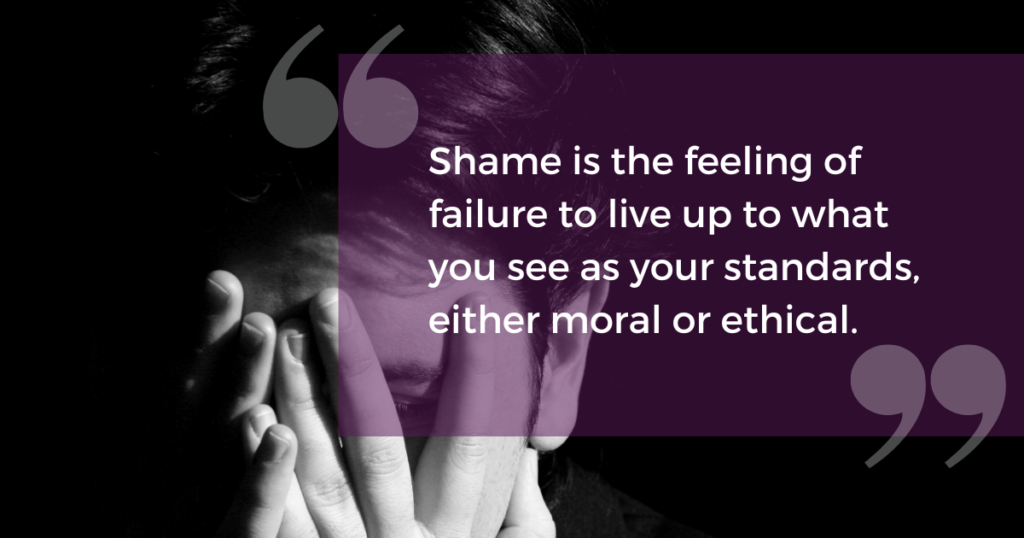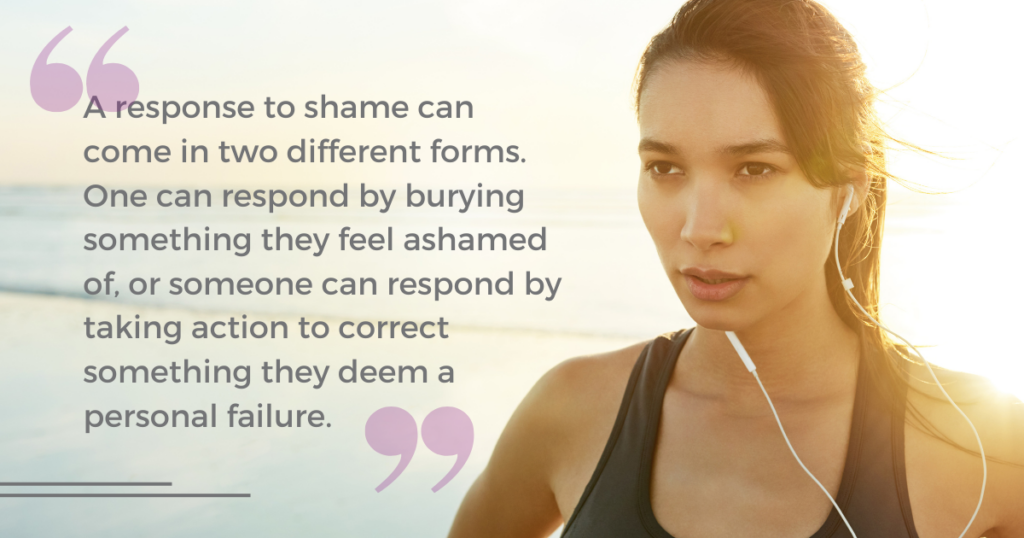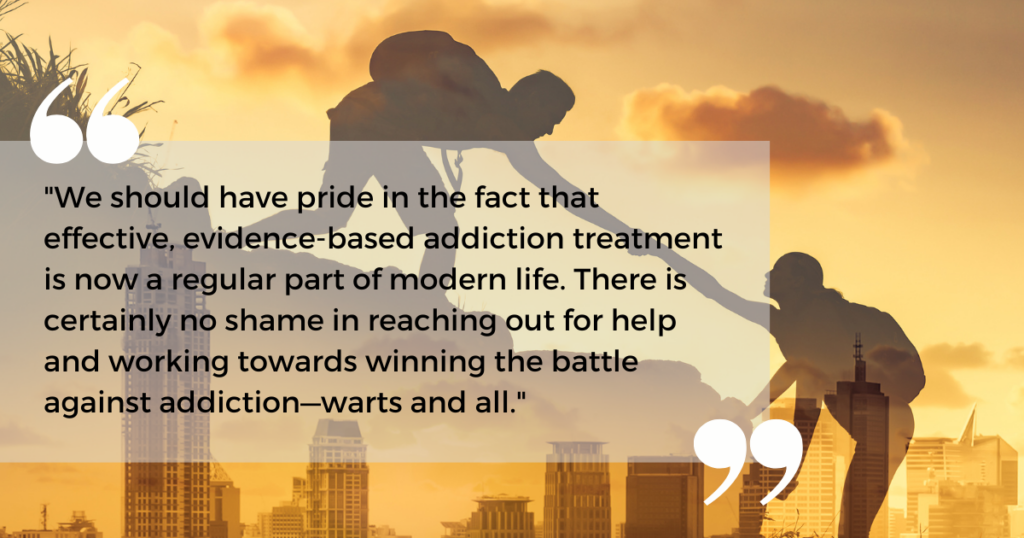The reasons why people with an addiction feel shame can be complicated and deeply rooted in long held and often untrue beliefs. These could be beliefs we as a society hold, or how they view themselves. Many people view drug and alcohol addiction as a moral failing or a weakness. Addiction is really a disease, however. One of the worst aspects of shame is that it can keep someone from getting the help they need.
What is Shame?
Shame is an emotion caused by the belief that others view you as undeserving, unworthy or fundamentally wrong. People experiencing shame often feel like they can’t change who they are, and have a sense of worthlessness. Shame is when we feel we have not lived up to other people’s standards. These feelings can lead to serious mental problems like depression and self isolation.
Shame is, therefore, a natural emotional response to addiction. But not all aspects of addiction require that we feel shame. We don’t see addiction as a moral failure, but rather the result of a variety of external circumstances and aspects of biochemistry. The sooner someone realizes that addiction is a disorder of the brain that can be fixed, the sooner the weight of shame can start to decrease.
What is Guilt?
Guilt is an emotion someone feels after taking an action which they later believe was wrong. Guilt is often paired with regret, a feeling in which someone wishes they hadn’t done something. It’s the feeling that you haven’t lived up to your own standards and let yourself down.
Shame is a lot like guilt in many ways, but they’re two distinct categories of emotion. Same can often overlap with guilt. You can feel shame over something you aren’t necessarily guilty of, considering guilt may imply a transgression. Shame also involves potentially learning something about yourself that you may find personally unpleasant for a variety of reasons.
Shame & Regret
There’s an important distinction between regret and shame. We often regret choices that led to bad or unwanted outcomes. You might regret choosing the lasagna at an Italian restaurant because it upset your stomach, but you don’t feel ashamed of that choice. Things you regret don’t hit quite as deep as something you feel ashamed of. Regret can be viewed as a way that humans learn to cope with choices that otherwise might “eat us alive” internally.
“A lot of people, especially those suffering from substance use disorders, confuse guilt and shame,” said Michael Walsh. Walsh is the director of clinical outreach at Landmark Recovery. “Early on in recovery, for me, it was helpful to hear the differences—that guilt was associated with doing something bad and that shame was a way of describing the feeling of being bad for having done something wrong. Having regrets is also something different, too.”
“For some, it may also be helpful to feel guilt for doing something (or not doing something) due to an addiction,” Walsh said. “It’s true, though, that feeling shameful versus guilty or regretful about it cuts deeper.”

Can Shame Be Useful?
Shame can often be described as a feeling that we should and do feel over something that’s negative. It’s also a unique and essential component of public and private life that helps guide us towards being a better version of ourselves if our response to it is to act on improving ourselves when it’s felt.
A response to shame can come in two different forms. One can respond by burying something they feel ashamed of, or someone can respond by taking action to correct something they deem a personal failure. If someone feels shame around an addiction they’re suffering from, perhaps it will keep them from reaching out for help.
The shame of an addiction should be harnessed as a driving factor to seek help. In this way, it can be a useful motivator depending on how someone responds. We should also remember that there isn’t a single person alive who possesses zero shame over every aspect of their lives and behaviors—it’s a universal human emotion.
Elaborating on Key Differences Between Guilt, Shame, and Regret
“Going back to the differences between guilt, shame, and regret, ‘normal people’ can usually tell the difference between something that we should regret, feel guilty about, or feel shame about,” Walsh said. “One key thing separates normal individuals from those in early recovery. Those in recovery can have trouble assessing the correct feelings with the associated action, behavior, or thoughts.”
In this sense, it would then be correct to view shame as a motivator that can help as a key emotional driver in the recovery journey. It’s also important that patients grasp these differences as they recover or the recurring feelings of shame for the past, which they might assign to it, can lead to relapse.
“Wallowing in shame can certainly help or contribute to people who continue using substances non-medically,” Walsh said. “Thoughts like, ‘what’s the use? I’m bad anyway,’ can shift the trajectory downward. But the flipside is that it can still be a great motivator to strive for recovery when we realize that we aren’t inherently bad regarding behavior but simply acting negatively. Those early in recovery have to remember that with treatment we can change.”
It can complicate the recovery process when patients continue to feel ashamed, regretful, or full of feelings of guilt as they begin recovery. It’s important to learn the difference and realize that patients need not be ashamed of being in recovery.
“The key is to forgive ourselves for the things we feel guilty for and make amends, ending our negative behaviors, then moving on with our lives after forgiving ourselves,” Walsh said. “For me, that’s where others can find healing and true recovery.”

How Do Shame and Addiction Relate?
The way shame relates to addiction usually stems from the way we feel about an addiction specifically. We can be ashamed of an addiction, but it’s because we’re reacting internally to something that makes us feel bad or act in ways that we collectively regard as antisocial or against our modern standard of a well-lived life, however that looks to us. Shame, in this case, can be useful. But it doesn’t quite describe an addiction itself, considering addiction’s nature as a disease that’s often influenced by biochemistry and genetics, and therefore can’t be described as a choice.
Shame itself may not emanate from being addicted to substances. It may be something that influences someone’s choice to use a substance non-medically as a trauma response. Something you feel ashamed of can cause you to react in a negative way. This can further a feedback loop of addiction to a harmful substance. If you feel deep shame about that particular thing, event, or deed, abusing substances can be a common reaction. It’s especially the case with those who might’ve had an adverse childhood experience (ACE).
In 2013, Owen Flanagan, a Duke University philosophy student writing in response to questions around the relationship between shame and addiction, wrote that “there can be shame without blame.” His argument is that shame and addiction can still coexist, and that shame is simply a natural response to addiction.
“[Addiction can be described as the] failure of [rational agency] or self-control with respect to the substance. [There can be] shame at both this failure, and the failure to live up to the standards for a good life that the addict himself acknowledges and aspires to,” Flanagan wrote. “Feeling shame for addiction is not a mistake. It is part of the shape of addiction, part of the normal [experience] of addiction, and often a source of motivation for the addict to heal.”
Shame and Stigma
Shame can be related to stigmas in society. Stigmas can be useful in reinforcing why antisocial behavior is negative. But stigmas become increasingly useless once society has developed ways of dealing with what causes shame. One such stigma that we should do away with is the stigma around addiction. This in turn drives us to repress the discussion of it, directing us towards failure at targeting and treating such a salient disease.
Recent medical developments and research have given us a way forward in treating addiction. This effectively defeats the idea that addiction is something to stigmatize. Some stigmas, such as the stigma of addiction, are better off left in the dustbin of history. We should have pride in the fact that effective, evidence-based addiction treatment is now a regular part of modern life. There is certainly no shame in reaching out for help and working towards winning the battle against addiction—warts and all.
Learn More
To learn more about how Landmark Recovery can help you achieve recovery, call us today at 888-448-0302. Our dedicated admissions specialists can help you find the treatment you deserve. You don’t have to be ashamed of getting help! Don’t wait to reach out today.

Choose Recovery Over Addiction
We're here 24/7 to help you get the care you need to live life on your terms, without drugs or alcohol. Talk to our recovery specialists today and learn about our integrated treatment programs.




